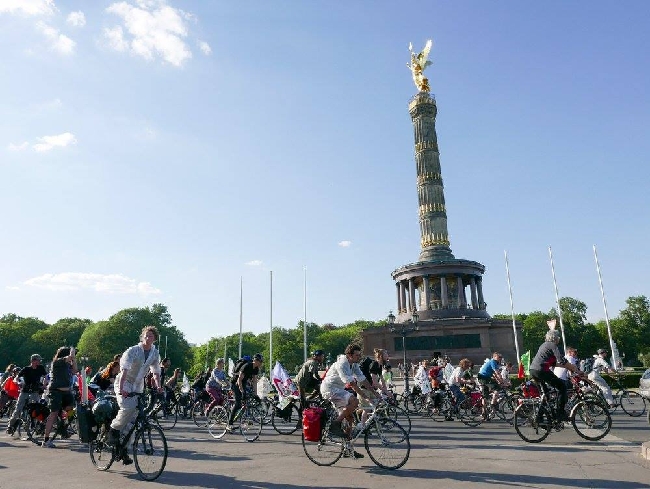The signs from the Degrowth-Conference having disappeared from the walls of the portentous building of Corvinus University, and the streets of Budapest emptied from the stalls and the babble of the Degrowth-Week, the time is ripe for another evaluation-round. The conference can be assessed from diverse perspectives – with disparate outcomes, I suspect. Even if I am relatively new to the Degrowth-scene, I am strongly persuaded that this is a decisive time in the evolution of the European intellectual and activist degrowth-movement. Therefore, I will look here at the conference as a device for measuring the pulse of the community of degrowth-supporters, and as a milestone to reflect on its overall direction.
A key variable in the complex success-equation of the degrowth movement, it seems to me, would be to generate a more effective and rewarding mutual fertilization between degrowth scholars and degrowth activists. The currently prevailing assessment in the degrowth-community seems to be that there is “too much of academia and not enough activism”. Even if the critique of ‘sterile intellectualism’ should not come as a surprise in the framework of a friction-prone (even if potentially fruitful, better: possibly indispensable!) alliance between the academic and activist spheres, my concern is that bridging the two will probably require a more focused and deliberate effort than is currently the case. Failing to build a strong bridge between the two spheres, I’m afraid, would threaten to dissolve the core of the degrowth discourse(s) via two parallel threats:
How to avoid these dangers? In my understanding, the interface of movements and scholarly knowledge-gain towards challenging a continued growth-path in society at large remains under-explored. Concrete proposals (policy initiatives, collective and individual practices – including political practices, in the broader sense of the term) towards undermining growth-dependency are put forward by several proponents (Tim Jackson, Uwe Schneidewind & Angelika Zahrnt, Serge Latouche, among others). They are worth more serious considerations as guidelines for the action of degrowth-supportive movements (over 150, according to the “Degrowth in Movement(s)" project). There are, of course, many other sources of inspiration for a more fruitful ownership-taking of degrowth by civil society agents. The pocket book “Re.imagining activism. A practical guide towards the Great Transition”, for example, contains tailored reflections and tools for NGOs and SMOs to assess and (re-)design their organizational outlook and strategies to fit the challenge of a “Great Transformation” on a Polanyian-scale.
While the world can be changed through a myriad of micro- and macro-level strategies, from alternative sub-cultures all the way up to international regulatory frameworks, the specificity of degrowth is to seek ways of breaking the vicious cycle of economic growth, private profit-maximizing, and consumerism. And this can neither be achieved by pushing a degrowth-party into power, nor by shouting out to an unresponsive world “make love, not war”, but rather by creating cultural and economic infrastructures that – to borrow Uwe Schneidewind and Angelika Zahrnt’s expression - “make it easier to live the good life” for the many. And social movements, along with NGOs and scholars partnering in the degrowth-community, have a big role to play in this.
Nächste Woche, vom 6.-8-Oktober 2017, findet in Leipzig die Konferenz „Selbstbestimmt und Solidarisch“ statt. Diese Konferenz ist an der Schnittstelle von Migration, selbstbestimmter Entwicklung und ökologischer Krise angesiedelt. An dieser Stelle beschreibt Olaf Bernau von Afrique-Europa-Interact, worum es gehen wird. Spätestens seit Geflüchtete im Sommer 2015 das europäische Grenzregim...

Endlich ist es soweit: Der erste Satz Texte und Videos aus dem Projekt "Degrowth in Bewegung(en)" ist jetzt online. Hier beleuchten Vertreter*innen verschiedenster sozialer Bewegungen das Thema Degrowth und benennen aus ihrer Sicht die Gemeinsamkeiten und Unterschiede sowie Kritikpunkte an Degrowth. Ziel des Projekts ist ein offener Dialog- und Vernetzungsprozess, der den Austausch, das gegense...
Eine Sendung des unabhängigen Nachrichtenmagazins Kontext TV zur Degrowth-Konferenz: Quelle: www.kontext-tv.de Von freier Software zu "Open Source Hardware": Die Peer-to-Peer-Ökonomie als Alternative zu Markt und Staat 09.12.2014 In den vergangenen 20 Jahren ist im Bereich der freien Software-Entwicklung ein internationales Netzwerk entstanden, das patentfr...